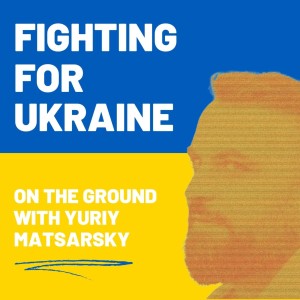
Saturday Sep 23, 2023
What Compromise With Your Murderer Would You Agree To? - September 23rd 2023
September 23rd 2023
Yuriy reflects on the strong bonds of friendship formed in the midst of conflict, noticing how common purpose and shared danger break down barriers. He also discusses the toll of the ongoing war, the tragic loss of comrades and the world's diminishing attention to the Ukrainian conflict despite the continued suffering of those on the front lines.
You can email Yuriy, ask him questions or simply send him a message of support: fightingtherussianbeast@gmail.com
You can help Yuriy and his family by donating to his GoFundMe: https://www.gofundme.com/f/help-yuriys-family
Yuriy’s Podbean Patron sign-up to give once or regularly: https://patron.podbean.com/yuriy
Buy Yuriy a coffee here: https://bmc.link/yuriymat
TRANSCRIPT: (Podbean app users can enjoy closed captions)
It is 23rd of September.
I have already mentioned that I travel quite extensively and have moved along the front line several times. In each unit I've visited, I have acquaintances, often more than just acquaintances, true friends. Usually, on the front lines, people quickly find common ground, even if they differ greatly in age, social status, education, or rank. Common purpose and shared danger effortlessly break down all these civilian and military barriers, leveling all possible conflicts. It seems to me that such strong bonds of friendship as on the front lines, are impossible to find anywhere else. If you have neighbors or acquaintances who are veterans, just pay attention to how warmly they feel towards their comrades in arms, not every close relative, to be honest, can expect such relations.
I am confident that my listeners with military experience will confirm my words. Under fire, everything becomes simpler. Stereotypes instantly vanish. And it's genuinely amazing, because in civilian life, your circle of communication usually includes only colleagues and neighbors, whereas in military you have thousands of comrades. It is incredibly pleasant to visit units where you were a few months ago and meet familiar faces who are genuinely happy to see you. This is what real brotherhood feels like, born in the relentless fire of the struggle for liberation.
However, unfortunately, there is also a dark side to this story. I increasingly hear about someone among wars with whom army life brought me, who is no longer with us. Many conversations with my military brothers and sisters turn into a list of the deceased and severely wounded.
"Do you remember Alexander, the one who was our machine gunner? He stepped on a mine, and when we found him, he had already bled to death."
"Our Oleg- you know, the tall one with tattoos- did not return from reconnaissance. He checked the ridge from which the Russians supposedly fled. We hope he is taken as a prisoner, at least then there is a chance to exchange him. But he is not on the list of the prisoners, so most likely our Oleg is gone."
"Natalia, who rescued our wounded, did not come back from the battle. At first she was considered missing, but we later found her evacuation van. The Russians targeted it with a rocket, even thought it was clearly a medical vehicle. She died and so did several other people in the van."
You see, these were living people, they had hopes and dreams, loved someone, had friends and works. They raised children, went to visit their parents on weekends. But then a deranged neighbor decided that they had no rights to any of it, that they should be his slaves. People did not agree with this, went to fight and died. They no longer love anyone, work nowhere, raise no children and visit no parents. They are no more. They perished in the terrible agony, just horrifying agony. And they continue to die every day for more than a year and a half now. Unfortunately, they will keep dying, because the war continues, possibly for one, two or even five more years.
The world, it seems no longer wants to acknowledge the Ukrainians who die every day. We probably failed the world's expectations by not winning in the first weeks and not completely annihilating the enemy. People abroad mention us less and less, and increasingly call for compromises with killers and rapists. But just try to put yourself in the shoes of someone who risks their life every day, whose friends? died in shelling, were tortured in captivity or suffocated under the debris of their own homes destroyed by Russian rockets. If you were that person, what compromise with your murderer would you agree to?
Comments (0)
To leave or reply to comments, please download free Podbean or
No Comments
To leave or reply to comments,
please download free Podbean App.